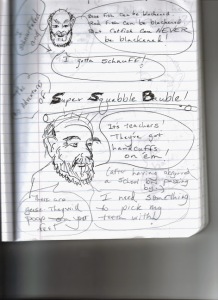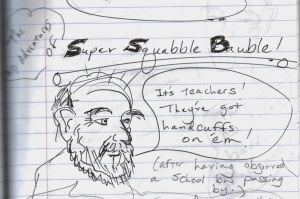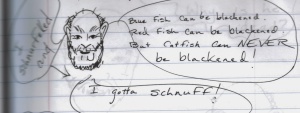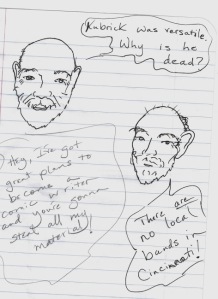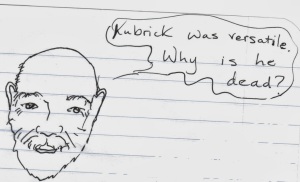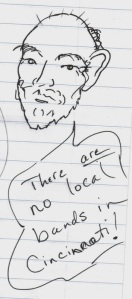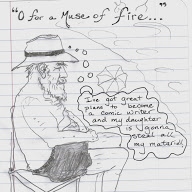In this essay, I will argue that Jonathan Swift’s “A Beautiful Young Nymph Going to Bed; Written for the Honour of the Fair Sex,” (British Literature 1640-1789, 652-4) and Lady Mary Wortley Montagu’s “The Reasons That Induced Dr. S[wift] to Write a Poem called ‘The Lady’s Dressing Room’”(779-81) are both examples of verse insults.I will further contend that the verse insult is a characteristic feature of Eighteenth Century British literature. In addition, I will discuss some of the attributes of the verse insult.I use the term “verse insult” to contrast this form with the earlier verse compliment, the same convention that William Shakespeare plays on in the sonnet which begins“My mistress’ eyes are nothing like the sun….” (Sonnet 130, The Complete Oxford Shakespeare, p. 392.) However, where Shakespeare gives the verse compliment a gentle tweak, writers of the Eighteenth Century, like Swift and Montagu, give it a violent wrench and turn it completely around.
The verse insult usually involves a personal attack. It may be directed at one or (usually) several specific individuals, as in the case of Montagu’s verse, which attacks both Swift and Alexander Pope. It may also be directed at a general group, as in the case of Swift’s verse, which attacks the entire “Fair Sex” in the person of “Corinna.”However, it is more usual that these two functions, both the general and the specific attack, are combined, maximizing the offense.This is, in fact, true of both the verses cited above. While Montagu refers specifically to the flaws and failings of both Swift and Pope, she also has several hard words to throw infor “wretched Humankind.” Similarly, while Swift’s Corinna is unreal, his verse is phrased as though she was real, and, thus, his attack is launched on a specific, if imaginary, person.
Where the verse compliment usually focuses on the beauty of a particular woman’s physical features, Swift’s verse insult reverses this and describes, not the beauty, but the hideousness of the physical features of his “lovely Goddess.”Montagu, realizing that men are valued more for their “wit” than their physical appearance, directs her criticism of Swift and Pope at their “Heads” rather than at their bodies. Montagu also accuses Swift of impotency. That this strikes me as yet another attack on his “head” is probably an indication that I have immersed myself too deeply in the literature of the Eighteenth century.
Another quality perceptible in the verse insult is the use of comparatively informal, even vulgar, diction. A particularly noteworthy example of this can be seen when we contrast a line from Shakespeare’s sonnet referred to above with a line from each of the two verses with which this essay deals:
Shakespeare: “If snow be white, why then her breasts are dun;” (COS, p 392.)
Swift: “Her flabby Dugs, and down they drop.” (l. 22, BL, p 653)
Montagu: “Peeps in her Bubbies, and her Eyes,” (l. 64, p 781)
Where Shakespeare uses the standard word “breasts” to refer to the human mammary glands, Montagu and Swift choose words of a very different connotation.Swift, as is his wont, obliterates the distinction between human and animal with the choice of one his all-time favorite words, “dugs,” a word which appears repeatedly in the work known as Gulliver’s Travels. This appellation is more closely akin to the words “udder” and “teat” than to either “breast” or, as Montagu writes, “bubbies.” It, and the context in which it is placed, inspire nothing so much as disgust and revulsion. The “dun breast” of Shakespeare’s mistress seems absolutely alluring in comparison.
On the other hand, Montagu, who writes with a motive opposite to Swift, uses a term more likely to evoke a giggle than a retch.“Bubbies” suggests a humorous and affectionate, if irreverent, stance toward the mammary glands. My old American Heritage Dictionary labels this a slang word, but declares that it was “formerly in standard use” citing a quote from Dryden (“And rudely with your pretty bubbies play” ) apparently in support of this claim.I was unable to find the source of this quote, but did find that in the poem Pygmalion and the Statue (386-9) Dryden uses the term “breast” four times and “bosom” once, but never mentions bubbies.Therefore, it seems likely that “bubbies” was less standard than “breasts” even in the Eighteenth century.We can also deduce this from the context in which Montagu places it. Swift obviously appears more ridiculous in the act of “peeping” at “bubbies” than he would if he were merely “gazing” at “breasts.”Moreover, Montagu makes it clear that the ridicule is intended to be at the expense of Swift, rather than the bubbies, by likening them in this line to another round body part that comes in pairs, the eyes.
Yet, “dugs” and “bubbies” are scarcely the coarsest terms to be discerned in these two verses. Both also employ incognito obscenities describing the excretion of human (or, characteristically, in the case of Swift,) animal waste: p—sed and shite.In Montagu’s verse insult, the incognito obscenity is reserved until the very last word, which accentuates its impact.Swift positions his incognito obscenity less strategically (in line 62), yet contrives to emphasize it through the use of alliteration, paving the way with a succession of three plosives and echoing it with three more in line 63:
“And Puss had on her plumpers p–sed;
“A Pigeon picked her Issue-peas;” (654)
There is no other notable instance of alliteration in this verse. The effect is like an arrow pointing to the incognito obscenity, as if Swift wanted to shout “Look! Look! I USED A NAUGHTY WORD!”
That the contrivance is conscious can be further seen in the unprecedented appearance of the pigeon, chosen more for the first letter of its name than for its known habits, which, as far as I have ever heard, do not include flying into the bedrooms of human beings and picking at the sores on their sleeping bodies. “Puss,” “Shock” and the “wicked Rat” are all believable inhabitants of Corinna’s “Bow’r,” and their presence surely would have deterred the intrusion of the pigeon, if Corinna herself had been insufficient to that purpose. That the pigeon is not a pet of Corinna’s can be inferred from the fact that it, unlike Shock and Puss, does not have a name. The implausibility of its presence in this verse serves as another pointer to the incognito obscenity which precedes it.
It is interesting that such raunchy language should come from two writers of exalted social position: Swift, a high-ranking clergyman, and Montagu, a female aristocrat. On the other hand, a writer of less secure social standing, such as John Gay, might be less free to offend. Gay’s verse on themes similar to those found in the two verse insults addressed here, “The Toilette; A Town Eclogue; Lydia,” is not a verse insult, as is evident from the fact that it attacks no one.Moreover, Gay’s diction is far more delicate than either Montagu’s or Swift’s. No words more offensive than “molest” or “coquette” are to be found in Gay’s verse.
The verse insult, then, along with its piquant vocabulary, appears to have been a luxury more often indulged in by the rich and well-connected, like Montagu, or social reformers, like Swift, than by struggling members of the middle class, like John Gay. Further evidence of this can be gleaned with a cursory glance at the work of aristocrat John Wilmot.
The verse insult is a reflection of the general contentiousness of the Eighteenth Century. It also reveals something of the nature of the aesthetic of the Eighteenth Century, which valued wit and cleverness over beauty and delicacy. Moreover, it is a reminder to us that writers of the Twentieth century do not possess the monopoly on naughty words.

The Rejected Poet, William Powell Frith
Works Cited:
DeMaria Jr, Robert, Ed.British Literature 1640-1789: An Anthology. Cambridge, MA: Blackwell, 1996.
Morris, William, Ed. The American Heritage Dictionary of the English Language; New College Edition. Boston: Houghton Mifflin, 1976.
Wells, Stanley, et al, Eds. The Complete Oxford Shakespeare; Volume I: Histories. Oxford: Oxford UP, 1987.





